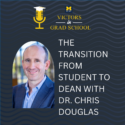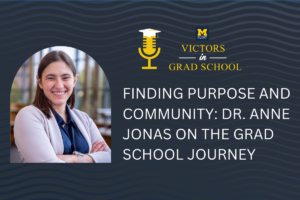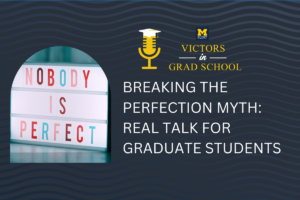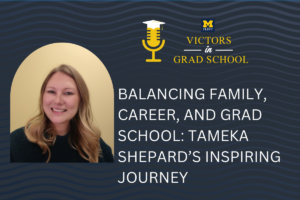
Graduate school is a journey that resonates differently with each individual. For Dr. Chris Douglas, the Interim Dean of the College of Arts, Sciences, and Education, and a professor of economics at the University of Michigan Flint, this journey began with a passion for mathematics and science, and has culminated in an inspiring academic and professional career. In this week’s episode of Victor’s in Grad School, Dr. Douglas shares his experiences, offering valuable insights and strategies for achieving success in graduate school.
Discovering His Path
Dr. Douglas began his academic journey at Michigan Technological University, where he pursued a double bachelor’s degree. It was during this time that his passion for economics was ignited. He initially embarked on an engineering degree due to a strong affinity for math and science. However, an economics course shifted his trajectory, showcasing how mathematical models could elucidate real-world economic phenomena such as unemployment, recessions, and inflation.
This newfound interest led Dr. Douglas to pursue further studies in economics, leveraging the commonalities between economics and engineering, particularly in the use of advanced mathematical and statistical techniques.
The Decision to Pursue a PhD
The decision to pursue graduate studies is a significant one, often influenced by various factors. For Dr. Douglas, it was a combination of personal interests and the state of the job market in 2001, a period marked by an economic recession. Encouragement from a professor, who recognized his aptitude for economics, further motivated him to apply for PhD programs. Ultimately, Dr. Douglas chose Michigan State University for his PhD, citing proximity to home, the program’s prestigious ranking, and a generous fellowship package as key factors.
Transitioning to Graduate Studies
Transitioning from undergraduate to graduate studies can be daunting. Dr. Douglas likens the experience to the difference between drinking from a garden hose and a fire hose, emphasizing the increased intensity and workload of a PhD program. He highlights the importance of building a support system by connecting with fellow classmates, especially in programs with rigorous coursework like economics or engineering.
One of Dr. Douglas’s crucial strategies for success was collaborating with peers on complex problem sets, fostering a sense of camaraderie and support during challenging times. This approach not only facilitated academic success but also helped mitigate the loneliness that can accompany prolonged graduate studies.
From Academia to Administration
While a PhD program prepares students for academic and research careers, it often doesn’t directly equip them for administrative roles. Dr. Douglas’s transition to the interim dean position was shaped more by accumulated experiences and mentorship than formal education. His progression from department chair to associate dean, and now interim dean, underscores the value of building relationships, seeking mentorship, and being open to feedback and continuous learning.
Tips for Success in Graduate School
Drawing from his extensive experience, Dr. Douglas offers several valuable tips for aspiring graduate students:
- Build Connections Form relationships with classmates and professors to create a network of support and collaboration.
- Seek Help Early Utilize office hours and resources provided by faculty to stay ahead, especially in challenging subjects.
- Don’t Procrastinate Begin work on major projects early and break them down into manageable steps to avoid feeling overwhelmed.
- Embrace Mentorship Seek guidance from experienced faculty and peers to navigate the complexities of graduate school and career development.
Dr. Chris Douglas’s journey through graduate school to his current role as an interim dean illustrates the multifaceted nature of academic and professional success. His insights serve as a valuable guide for current and prospective graduate students, emphasizing the importance of planning, collaboration, and continuous learning. For those embarking on this journey, Dr. Douglas’s story is a testament to the rewards that perseverance, support, and strategic planning can bring.
For more information on graduate programs at the University of Michigan Flint, visit UM-Flint Graduate Programs.
TRANSCRIPT
Dr. Christopher Lewis [00:00:01]:
Welcome to the Victor’s in Grad School, where we have conversations with students, alumni, and experts about what it takes to find success in graduate school.
Dr. Christopher Lewis [00:00:11]:
Welcome back to Victor’s in Grad School. I’m your host, doctor Christopher Lewis, director of graduate programs at the University of Michigan, Flint. Really excited to have you back again this week. Every week, I love being able to sit down, talk to you, walk with you on this path that you’re on because it is a journey. You you and I are on a journey together as we’re looking at graduate school, as you’re considering graduate school, as you you know, and and you might be at many different places. You could be just starting to think about graduate school, haven’t even applied. You might maybe you applied, and you just got that acceptance letter. Maybe you’re in graduate school, or you’re getting toward the end of graduate school, and you see that light at the end of the tunnel.
Dr. Christopher Lewis [00:00:52]:
No matter where you are, this is a journey that you’re on. And throughout this journey, there are many opportunities for you to be able to find success. And that’s that’s what this show is all about. This show is all about helping you to find success sooner. That’s why every week I love being able to bring you different people, different guests with different experiences that can talk about those experiences and share what they learned in their own graduate school journey to be able to help you on yours. This week we’ve got another great guest. Doctor Chris Douglas is with us. And Chris is the interim dean of the College of Arts, Sciences, and Education and a professor of economics at the University of Michigan Flint.
Dr. Christopher Lewis [00:01:34]:
And he’s been at the University of Michigan Flint for quite a few years. And his journey led him from being a undergraduate student at Michigan Technological University to becoming a PhD student at Michigan State University. So we’re gonna be talking about that journey that he went on and which led him to being a faculty member and working with students like yourself in at the University of Michigan Flint. Chris, thanks so much for being here today.
Dr. Chris Douglas [00:02:00]:
Oh, you’re welcome. Great to be here, Chris.
Dr. Christopher Lewis [00:02:01]:
I’m really excited to have you here. And I wanna turn the clock back in time first because I as I mentioned, you did your undergraduate work at Michigan Technological University and got a double bachelor’s degree when you were up there. And at some point in that time that you were working on those bachelor’s degrees, you made a decision. You made a decision that you wanted to continue with your education. Bring me back to that point. And why did you choose to go to graduate school?
Dr. Chris Douglas [00:02:31]:
So if I wanna go way far back, I graduated high school in 1997. I I always thought I wanted to be an engineer because I liked math. I liked science, and I was pretty good at both. So I went to Michigan Tech because they had a pretty good engineering program, gave me a good financial aid package. So I started my engineering program. It would be fall of 1997. And then as part of general education, I took an economics course. I had never taken economics in high school.
Dr. Chris Douglas [00:02:53]:
I took an economics course. It was principles of macroeconomics. I forget if this was 1997 or 1998. I thought it was fascinating. I really thought it was interesting how you could take pretty straightforward mathematical economic models and use them to make real world predictions about the complicated world around us. They explain things like unemployment, recessions, inflation, the business cycle, all the things that we care about as voters, as American citizens, as workers. So I decided to take a microarchaplics course and then I had transferred in several credits because I dual enrolled as a high school student. So that gave me some flexibility to pick up another bachelor degree without really extending my stay in college.
Dr. Chris Douglas [00:03:35]:
So since I liked economics quite a bit and it turns out there’s a lot of commonalities in terms of of the techniques used in economics and the techniques used in engineering. And would it appear that way to be be that way on the surface, but economics involves, especially at the graduate level, lots of math, lots of calculus, lots of statistics, lots of the same techniques used as engineering. So the two majors really complemented each other. So then I became a senior in 2,001. I thought I wanted to get a job in the engineering field. I went on several job interviews, and I started to think like, no. This really isn’t for me when I started learning about what a career in engineering would entail. It’s for a lot of people just wasn’t really for me.
Dr. Chris Douglas [00:04:13]:
And you might remember back in 2001, there was a recession, so the job market wasn’t really that robust anyway. And then an economics professor during an office hours visit kind of played at a bug saying, no. You’re pretty good at economics. You might think about a PhD program. And that bug in my ear kinda grew. And then I decided to take the GRE, apply to graduate schools, got accepted to Michigan State, and the rest is history.
Dr. Christopher Lewis [00:04:37]:
Now you just mentioned that you went to Michigan State University for your PhD in economics, and every person goes through a process of looking at their options. And I’m sure you had had options out there. You applied to numerous schools to look at your options. Why did you choose to attend Michigan State University for your degree?
Dr. Chris Douglas [00:04:58]:
So a few reasons. 1st, I was close to home. I grew up in Michigan. I bounced around a lot as a kid, but always in Michigan. So Michigan State was maybe 3 hours from my hometown, which was nice. Michigan State was a a highly ranked program in the economics field. Depending on the ranking, it’s anywhere between 25th 35th, something like that. So we’re respectively ranked, which would make it easier to get a tenure track job, which was my goal.
Dr. Chris Douglas [00:05:22]:
The faculty were well published, heard good experiences from the graduate students I talked to when I visited campus, went thinking where I wanted to attend, and they gave a a generous fellowship package where, in my 1st year, I was able to serve as a teaching assistant. I always wanted to teach as as well as doing research, so teaching was really important to me. So that teaching assistantship my 1st year meant that I would hold office hours, grade papers, I worked at a help room. But that really laid the groundwork for me to teach my own independent class since my 3rd year and beyond in graduate school. And that teaching experience was really crucial to get my tenure track job here at the University of Michigan Flint. And it really hit the ground running because once I graduated from the PhD program, I wasn’t teaching 1 class a semester like I was at graduate school. I was teaching 3 classes a semester while trying to work on research just like I was doing at graduate school. So graduate school is a lot of work, but once I got my full time job here, the workload totally increased.
Dr. Chris Douglas [00:06:16]:
So having that teaching experience really helped me hit the ground running. It really got my foot in the door to academia because prospective employers saw that I had the teaching experience. And the course evaluations are pretty good for my classes, so I thought that would help. Universities feel pretty comfortable that they were hiring a decent instructor.
Dr. Christopher Lewis [00:06:34]:
Now every person, as they go from one educational model to a new educational model, from one degree to another degree, you have to learn things. You have to figure out what is different, but also what is the same. And you did make that transition going from the bachelor’s degree at Michigan Technological University to Michigan State University. And you made that transition from a bachelor’s into the PhD, and you found success. You got through the program. You got your degree. And I guess as you think back to the education and the transition that you went through, what did you have to do as you transitioned into your PhD to set yourself up for success? And what did you have to do to maintain that success throughout graduate school?
Dr. Chris Douglas [00:07:21]:
So a PhD program is just more much more intense than a bachelor degree program. So if a bachelor degree program is like drinking from a garden hose, a PhD program is like drinking from from a fire hose. So you just have to be ready for the amount of work, the amount of responsibility that comes from being in a graduate program. I would assume a master’s program I’ve never been to in a dedicated master’s program, but I’m guessing a master’s program is somewhere between a bachelor and a PhD program. So it’s kinda like anything else in life. The farther you go, the more the workload steps up. You just have to be ready for that and expect it. And then think through strategies of how to be successful.
Dr. Chris Douglas [00:07:59]:
So one strategy I found was and this was absolutely crucial for me, was to get to know my fellow classmates in graduate school because especially in the 1st year, we would work through lots of problem sets. Economics graduate school is a lot like an engineering program that we have these complicated problem sets that require lots of complicated mathematics to complete. And that’s just much more feasible to do at a group setting rather than by yourself. And it’s also good to have that support system too because graduate school can feel like a bit of a lonely experience. A PhD program is 4 plus years. It took me 5 years. You know, 6 years is not uncommon. And you’re doing that in your twenties where everything feels like a lifetime at that point because you’re in your twenties.
Dr. Chris Douglas [00:08:38]:
You’re still pretty young. So it’s really hard to see that light at the end of the tunnel, although looking back, 5 years feels like a blink of an eye. So it’s just good to have that support system where everyone’s in the same boat, everyone has the same goal, get through this graduate program so that we can, you know, fulfill our postgraduate goals. And a PhD program outfit is a 10 year track job, but in an economics PhD program, it’s not always a 10 year track job. It could be a job at industry. That’s pretty common. A job with the federal government. That’s also very common for people who work for, say, the Federal Reserve or the Federal Trade Commission, things like that.
Dr. Chris Douglas [00:09:12]:
But everyone has the same common goal of, you know, get through the graduate program and in particular, get through the 1st year. Because of the PhD program, it’s very common to have, like, a 1st year exam. So my 1st year exams are called the preliminary exams, so those lasted over the course of 2 days. It was 4 exams over 2 days. You had to pass those, we called them prelims, to continue on to the 2nd year. So everyone in the program had the same goal, pass the prelims. So that made it really crucial to have the support structure with the with the rest of the our classmates. And I think that’s probably true for any other graduate program, including master’s programs.
Dr. Chris Douglas [00:09:48]:
You’ll get to know your students in the program. Most programs are probably cohorted. So get to know the students in your cohort because you’re all in the same boat. You’re working on the same assignments. You have very similar career goals. It’s just very, very helpful to have that support system.
Dr. Christopher Lewis [00:10:03]:
Now you completed that PhD. You became a professor of economics at the University of Michigan, Flint. And currently, as I mentioned, you are the interim dean for the College of Arts, Sciences, and Education. And I usually ask, when you think back to your graduate education, how did that prepare you for what you do? Now I will say that as a professor, it probably makes sense. You’re teaching courses that you learned about, you you researched about, that you figured out along the way. But I guess now as an administrator working with many different programs, and you look back at your graduate education, how did your graduate education prepare you to be a interim dean for a college?
Dr. Chris Douglas [00:10:46]:
Yeah. That’s an interesting question because I think the right answer is it really didn’t. A PhD program prepares you to be a tenure track faculty member, in particular, a tenure track faculty member at a research university because the focus of a PhD program in a major research university like Michigan State is work on research, you know, published in top journals, which, of course, is important. But there’s not as much of a focus on teaching, although that might have changed. It’s been nearly 20 years since I’ve graduated my PhD program. So that’s why I thought it was really crucial to get that teaching experience. And there’s really no preparation to serve at a leadership capacity at academia. And I think that probably makes sense because to to serve at a leadership capacity, that’s gonna be mid career at the earliest for academia because you have to get through the tenure process first to get tenure as an associate professor.
Dr. Chris Douglas [00:11:35]:
That’s 6 years. To get tenure to get promoted to a full professor, that’s probably another 6 years minimum after that. So we’re talking a dozen years after that first tenure track hire that’s pretty far removed from a PhD program. So I think it’s kind of the lessons you learned along the way and those gradual steps up in the leadership process that prepares you to take on a dean position. So I began as department chair after I became an associate professor back in 2013. I served as department chair in economics for quite a while, probably close to a decade. And then the College of Arts and Sciences before education was brought on board was reorganized into larger departments. And then I later served as the department chair of Social Sciences and Humanities.
Dr. Chris Douglas [00:12:17]:
I think I began that in 2022. That I was associate dean for a semester that I became interim dean starting the fall of 2024. So I think, a lot of leadership is just a learning experience. You get more and more responsibility. You take on larger and larger leadership roles, and, you know, things just kind of progress from there. So I think a lot of it’s mentorship too. I was fortunate to have some senior faculty mentor me when I was younger. People in the dean’s office mentored me, very well when I was working my way up through the ranks.
Dr. Chris Douglas [00:12:49]:
So I think a lot of it is experience, mentorship, and just learning along the way. Being open to feedback, course correction, and just working with people, building relationships.
Dr. Christopher Lewis [00:13:00]:
Now I know that you’ve had an opportunity to work and to teach and to connect with many different graduate students over the years. And as you think about not only your own graduate school experience, but also the experience you’ve had as a faculty member, as a mentor to other graduate students, and you think about success, what are some tips that you might offer to students, no matter what type of graduate degree that they are going into, that would help them find success sooner?
Dr. Chris Douglas [00:13:28]:
So I’ve taught in the master’s of public administration program ever since I started the university. I teach the quantitative methods class. I first taught it in winter of 2008. I’ve even scheduled to teach it in the winter 2025 semester despite me being the interim dean. So I’ve worked with a lot of masters of public administration students during my time here at University of Michigan Flint as well as being a great a former graduate student myself. So So like we talked about earlier, a big tip is make friends with your fellow classmates. You’re all in the same boat working on the same assignments. Collaboration is just makes life so much easier for you rather than trying to do things alone.
Dr. Chris Douglas [00:14:05]:
I know that’s become challenging, in the post COVID world where maybe things are more online. You know, people maybe still are a little bit more isolated than what they were before COVID, but somehow it’s just really important to connect with your fellow classmates and also connect with your professors. As professors, we’re here to help. We have office hours. Those are designed for students to drop in with questions. It’s always crucial for students in quantitative methods class to drop in sooner rather than a little later if they have questions because in a subject like statistics, if you start to fall behind, it’s really easy to fall behind quickly if you don’t get help right away. So we as professors, you know, we’re here to help. That’s why we have office hours.
Dr. Chris Douglas [00:14:45]:
That’s why we have our email address on the syllabus. We like helping students. That’s why we got to the profession in the 1st place. That’s why I wanted to get into academia rather than a job in industry either as an engineer or as a professional economist. So just being willing to talk to your fellow students, talk to your professors, don’t be afraid to ask questions. We really are here to help. I’ve always taught quantitative based class. I’ve never taught a class that’s required a lot of writing, that’s required a lot of term papers, but those classes exist, of course.
Dr. Chris Douglas [00:15:16]:
So if you have a big project that’s due at the end of the semester, it’s really important to start that right away. Don’t push things off to the last minute because that’s how you get overwhelmed. So a semester is 14 weeks long. 14 weeks sounds like a long time, but once the semester gets rolling, it’ll be week 13, week 14 before we know. So in addition to being a dean, I also like to long distance run as a hobby. I’ve run numerous half marathons. I’ve even run a few full marathons. And how do you run a full marathon? Well, it’s just one step at a time.
Dr. Chris Douglas [00:15:46]:
You just have to break it down to 1 mile at a time. Because if you just start thinking about the full 26 miles, you’ll just start to get totally overwhelmed. And I think that’s a good metaphor for graduate school or a graduate class as well. To You start thinking about the 30 page short paper you have to write. It’s gonna seem overwhelming. But if you start breaking it breaking it down into steps, what’s my topic? What’s my abstract? What’s my introduction? What’s my outline? What’s the conclusion I’m reaching? So you start to break it down into steps and you work on it step by step. All of a sudden, that marathon feels pretty doable. So it’s really important to stay on top of things, begin sooner rather than later, don’t procrastinate, And just break things down into bite sized chunks.
Dr. Christopher Lewis [00:16:27]:
I love that advice, and it is definitely a good metaphor for finding success. So I really appreciate you sharing that, and I appreciate all that you shared in the journey that you went on. Thank you so much for being here today, and I wish you the best.
Dr. Chris Douglas [00:16:41]:
Oh, you’re welcome. It’s great talking with you, Chris, and I’m sure I’ll see you around campus.
Dr. Christopher Lewis [00:16:45]:
The University of Michigan Flint has a full array of masters and doctorate programs if you are interested in continuing your education. Whether you’re looking for in person or online learning options, the University of Michigan Flint has programs that will meet your needs. For more information on any of our graduate programs, visit umflint.edu/graduateprograms to find out more. Thanks again for spending time with me as you prepare to be a victor in grad school. I look forward to speaking with you again soon as we embark together on your graduate school journey. If you have any questions or want to reach out, email me at flintgradoffice@umflint.edu.





